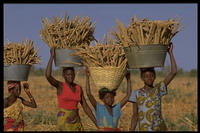African nations lack security
Sudan and seven other sub-Saharan African countries are among the 10 nations in the world most vulnerable to violent internal conflict and deteriorating conditions.

In the third annual "failed state" index, analysts for Foreign Policy magazine and the Fund for Peace, a not-for-profit organization dedicated to conflict resolution, Sudan was judged most at risk of failure. Violence in the Darfur region was the main contributing cause.
As evidence that troubles in failing states often cross borders, the report cited violence spilling from Darfur into the Central African Republic and Chad.
The five other African nations found most vulnerable were Somalia, Zimbabwe, Ivory Coast, Democratic Republic of Congo and Guinea.
The ratings are based on 12 social, economic, political and military indicators. The only non-African states among the 10 with the lowest scores were Iraq, second only to Sudan, and Afghanistan, ranked eighth.
Their presence high on the list shows that billions of dollars in development and security aid may be futile without a functioning government, trustworthy leaders and realistic plans to keep the peace and develop the economy, the report said.
Another African country, Liberia, was credited as the most improved, partly because an election in 2005 brought stability after more than a decade of civil war.
Liberia's economy is growing at 7 percent a year and it has disbanded its militia. Still, it ranked as 27th most failing state.
The growth of China's economy and a lull in violence in Chechnya helped China and Russia, respectively, to move out of the category of the 60 worst states.
Lebanon experienced the biggest slide, winding up in 28th place. War in the Middle Eastern country reversed much of the progress made since the end of its 15-year-long civil war in 1990.
Israeli air strikes last summer drove 700,000 Lebanese from their homes and caused an estimated $3.8 billion (2.85 billion EUR) in damage to the country.
Usually, long-serving strongmen preside over a nation's collapse, the report said. For instance, it said, three of the five worst performing states - Chad, Sudan and Zimbabwe - have leaders who have been in power for more than 15 years.
On the other hand, effective leadership can pull a nation from the brink of failure, the report said. It cited Indonesia's first directly elected president, Susilo Bambang Yudhoyono, as helping to steer the Southeast Asian country to stability after corruption and the devastation of the 2004 tsunami.
Pauline H. Baker, president of the Fund for Peace, said 12,000 sources were used to compile the ratings.
In an interview, she said foreign aid remained necessary even though spending alone will not prevent failure.
"You just cannot turn your eyes away from mass atrocities, which often accompany failing states," she said.
As examples of long-range impact of failure, Baker cited the effect turmoil in Sudan, an oil-producing state, could have on world oil supplies and mentioned the massive migration from Somalia, predominantly across Africa.
"The world's weakest states aren't just a danger to themselves," the report said. "They can threaten the progress and stability of countries half a world away."
Subscribe to Pravda.Ru Telegram channel, Facebook, RSS!



